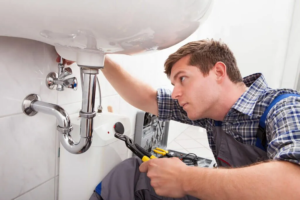Dealing with a noisy water heater can be quite a nuisance, but fear not!
In this comprehensive guide, we’ll walk you through the various types of noises your water heater may make and provide you with practical solutions to silence those irritating sounds.
Whether you’re a plumbing enthusiast, a DIYer, or simply looking to save some money on plumbing services, this blog post is for you. So let’s roll up our sleeves and get ready to tackle that noisy water heater head-on!
Identify the Type of Noise
The first step in fixing a noisy water heater is identifying the type of noise it’s making. Is it a rumbling, popping, banging, hissing, or screeching sound?
Just like interpreting a secret code, understanding the nature of the noise will unlock the clues to its origin. Once you understand the root cause, you’ll be better equipped to address the issue effectively.
Each noise can indicate a different problem, so pay close attention to the sound your water heater is producing.
Routine Maintenance
Just like any other appliance, your water heater requires regular maintenance to function optimally.
Routine maintenance is the key to maintaining the blissful sounds of a well-behaved water heater. Performing it frequently helps prevent noisy water heaters and extends their lifespan.
So, roll out your toolbox, gather basic tools such as a screwdriver, hose, and bucket, and dive into some essential maintenance tasks.
Sediment Buildup
One of the most common causes of a noisy water heater is sediment buildup. You know how life’s little particles tend to settle at the bottom of a riverbed, creating a bumpy terrain? Well, the same principle applies to your water heater.
Over time, sediments, minerals and debris can settle at the bottom of the tank, which is the reason behind popping or rumbling sounds. You’ll need to flush out the tank and remove the sediment to fix this.
Loose Heating Elements or Valves
Imagine a loose cog in a grand clock tower, ticking away haphazardly, creating an unsettling rattle. That’s precisely what loose heating elements or valves do in your water heater.
If a rattling or vibrating noise emanates from your water heater, it could be due to loose heating elements or valves. These components can become loose over time, resulting in annoying sounds.
What you need to do is to tighten them up and put an end to those pesky vibrations.
Pressure Relief Valve Issues
A hissing or high-pitched noise can often be traced back to problems with the pressure relief valve. It is designed to release excess pressure from the tank, but if it’s faulty or worn out, it may cause an annoying sound.
In most cases, all you need to do is to contact professional plumbing contractors to fix it.
Contact a plumber who is an expert in fixing a water heater, especially a noisy one, to assist you in fixing it by replacing the pressure relief valve. Expert plumbers can also help you repair it to ensure your water heater operates smoothly again.
Water Hammer
Does your water heater produce a loud banging noise when it turns on or off? That’s likely the result of a phenomenon known as a water hammer. It’s like a mischievous poltergeist lurking in your plumbing, waiting to surprise you with loud bangs.
This occurs when the water flow is abruptly stopped, causing a shockwave reverberating through the pipes.
You can resolve this issue by draining your plumbing system, which involves turning off the main water valve and opening the faucet at your home’s highest point.
Afterwards, drain the water from the lowest faucet. Once the water is drained, the chamber will fill with air, effectively addressing the water hammer problem.
Another method is to install a Water Hammer Arrestor. This device has an air-filled cylinder designed to absorb the force of sudden water pressure surges.
Expansion Tank Problems
If you have a closed-loop plumbing system and your water heater produces a thumping or popping noise, it could be due to expansion tank issues. An expansion tank helps absorb excess pressure, but it can lead to noisy disruptions if it’s not functioning correctly.
If there is a pressure loss in the expansion tank due to air leakage from either the valve or the diaphragm, you can add more air to the tank using an air compressor pump or a manual tire pump.
Using a manual pump is recommended to minimise the risk of damaging the tank’s bladder from excessive pressure.
Faulty Dip Tube
A faulty dip tube can also contribute to a noisy water heater. Its function is to deliver cold water to the bottom of the tank, but if it breaks or deteriorates, it can cause unusual sounds.
If purchasing a new water heater is not in your budget, you should consider fixing a water heater as an alternative solution. This may involve replacing the old dip tube and performing a tank flush. If you don’t know how to fix it, plumbing contractors will come to your rescue.
Contact a plumber who is an expert in bathroom plumbing to assist you in fixing it and ensure your water heater operates smoothly once again.
Dealing with Gas Burner Noises
If you use gas water heaters, addressing any unusual noises from the burner is crucial. A gas burner noise can indicate issues with combustion, gas supply, or even a dirty burner. Safety is paramount here.
The best thing you can do is involve a professional plumber who can then help you diagnose and fix the issue. You don’t want to do trial and error with such a sensitive issue to avoid burning your house.
Most plumbing contractors that offer water heater maintenance services can help you to fix that.
Addressing Electrical Component Problems
If you have an electric water heater, electrical component problems can contribute to a noisy unit. Buzzing, humming, or popping sounds might indicate issues with heating elements, thermostats, or electrical connections.
To fix it, contact an expert plumber who will go through the necessary steps to safely diagnose and rectify electrical component problems. These plumbing contractors often carefully inspect, clean, and replace electrical components if needed.
Conclusion
Plumbing issues can sometimes be complex and overwhelming, but following these tips will help you to tackle any noisy water heater situation.
If you find yourself stuck or unsure about any step along the way, don’t hesitate to reach out to professional plumbing contractors or a skilled plumber. They have the knowledge and experience to handle complex problems and ensure your water heater runs smoothly for years to come.




